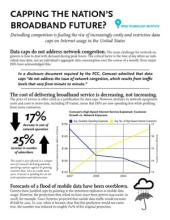Bandwidth Caps are Unnecessary and Counterproductive
The Open Technology Institute at the New America Foundation has released a report on data caps in the U.S. The report, Capping the Nation's Broadband Future, was authored by Hibah Hussain, Danielle Kehl, Benjamin Lennett, and Patrick Lucey.
The paper looks at the growing prevalence of monthly data caps by massive ISPs like Time Warner Cable, AT&T, and others. Authors conclude that data caps are effectively discouraging Internet usage with restrictions and limits that can be expensive. From the summary:
As this paper documents, data caps, especially on wireline networks, are hardly a necessity. Rather, they are motivated by a desire to further increase revenues from existing subscribers and protect legacy services such as cable television from competing Internet services. Although traffic on U.S. broadband networks is increasing at a steady rate, the costs to provide broadband service are also declining, including the cost of Internet connectivity or IP transit as well as equipment and other operational costs. The result is that broadband is an incredibly profitable business, particularly for cable ISPs. Tiered pricing and data caps have also become a cash cow for the two largest mobile providers, Verizon and AT&T, who already were making impressive margins on their mobile data service before abandoning unlimited plans.
The increasing prevalence of data caps both on the nation’s wireline and mobile networks underscore a critical need for policymakers to implement reforms to promote competition in the broadband marketplace. Data caps may offer an effective means for incumbents to generate more revenue from subscribers and satisfy investors, but making bandwidth an unnecessarily scarce commodity is bad for consumers and innovation. The future is not just about streaming movies or TV shows but also access to online education or telehealth services that are just starting to take off. Capping their future may mean capping the nation’s future as well.



